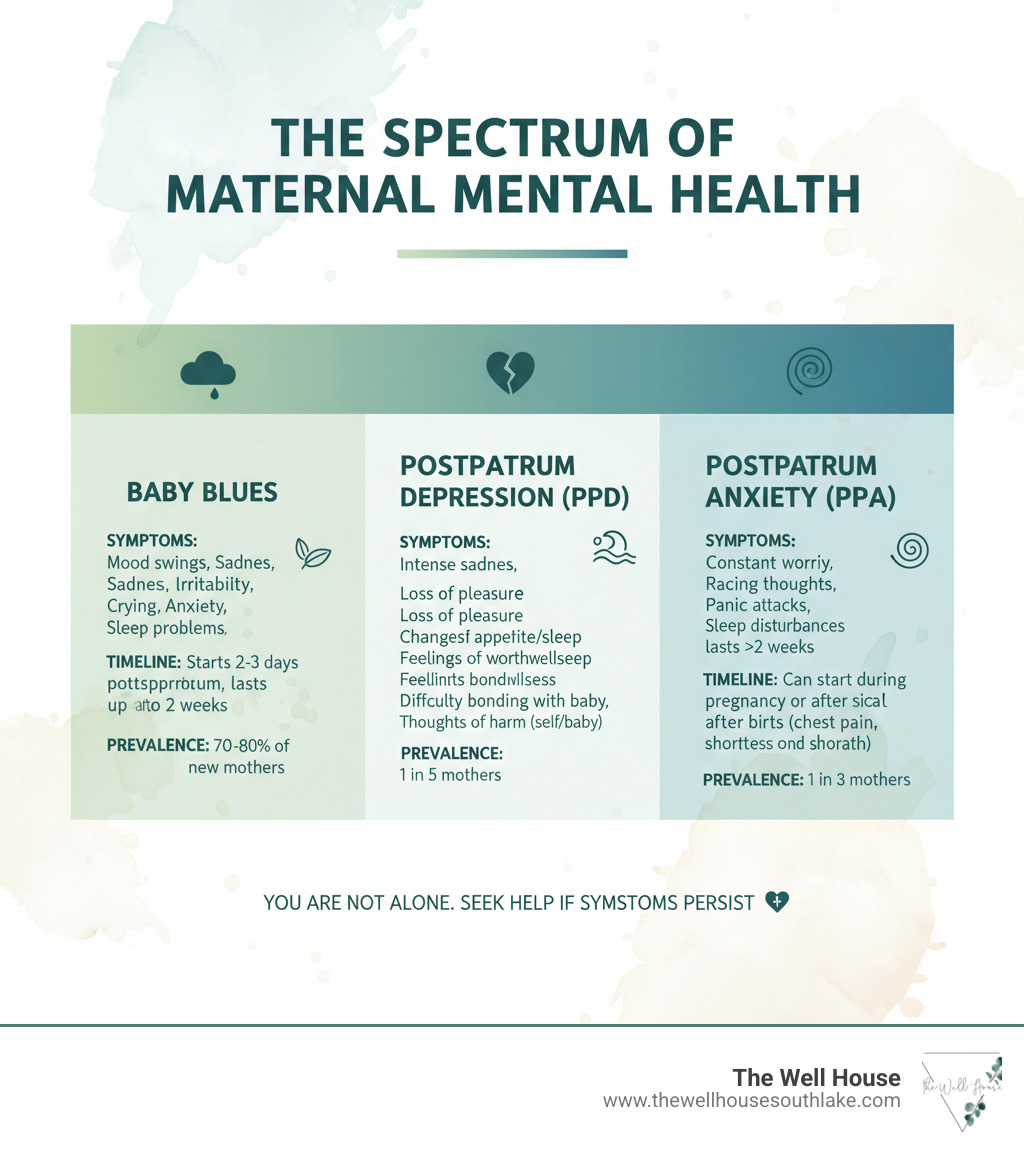Happy Mom, Happy Life: Nurturing Your Emotional Wellness
Why Emotional Wellness for Moms Is Essential
Emotional wellness for moms is not a luxury—it’s a necessity. If you’re feeling overwhelmed, anxious, or like you’ve lost yourself in motherhood, you’re not alone. The journey is an emotional rollercoaster, and it’s easy to feel like you’re drowning amidst hormonal shifts, sleep deprivation, and constant demands.
Quick answers for improving emotional well-being:
- Physical foundation: Prioritize sleep (even 20-minute naps), eat balanced meals frequently, and move your body daily
- Daily practices: Try mindfulness, gratitude journaling, and self-compassion exercises
- Build support: Connect with other moms, communicate needs to your partner, and don’t hesitate to seek professional help
- Know when to get help: If symptoms persist for two weeks or more, interfere with daily life, or include thoughts of harm
You might hear “happy mom, happy life” and wonder how you’re supposed to be happy when you barely have time to shower. The truth is, your emotional wellness matters—not just for you, but for your entire family. Prioritizing your mental health equips you to show up for your children, your partner, and yourself. It’s not selfish; it’s smart.
This article offers practical, realistic strategies to nurture your emotional wellness. We’ll cover everything from understanding postpartum mood changes to building a support system, with actionable tips you can use today.
I’m Jennifer Kruse, a Licensed Professional Counselor Supervisor specializing in women’s issues and motherhood support. I’ve spent years helping mothers steer the challenges of emotional wellness for moms with a holistic, soul-mind-body approach. Let’s explore how you can feel more like yourself again.

1. Understand Your Emotional Landscape
Becoming a mother brings a tidal wave of emotions. One minute you’re marveling at your baby, and the next you’re crying for no reason. This isn’t just in your head; it’s rooted in real changes. Emotional wellness for moms starts with understanding what’s happening beneath the surface.
Your hormones are in flux, you’re navigating a profound identity shift, and sleep deprivation makes everything harder. It’s common to feel overwhelmed, irritable, or disconnected. This doesn’t mean you’re failing—it means you’re human and adjusting to a massive life transition. Understanding where these feelings come from is the first step toward taking care of yourself. For more support, explore our resources on Postpartum Support: Help for Depression and Anxiety.
‘Baby Blues’ vs. Postpartum Mood Disorders
It’s crucial to know if what you’re feeling is the common “baby blues” or something more serious.
Four in five women experience the baby blues, which typically appear 3-5 days after birth. You might feel weepy, sensitive, or moody. The key difference is that you can still enjoy moments of motherhood and care for your baby. These feelings usually fade within two weeks.
If two weeks pass and you’re feeling worse, you might be experiencing a Perinatal Mood Disorder (PMD), such as Postpartum Depression (PPD) or Postpartum Anxiety (PPA). These can start during pregnancy and last up to a year postpartum.
- Postpartum Depression (PPD) goes beyond sadness. It can involve losing interest in activities, significant appetite changes, overwhelming guilt, and difficulty bonding with your baby.
- Postpartum Anxiety (PPA) involves all-consuming, often irrational worry. You might have racing thoughts and physical symptoms like a pounding heart or dizziness that interfere with your ability to function.
- Postpartum psychosis is a rare (1-2 per 1000 births) medical emergency requiring immediate attention, with symptoms like hallucinations or delusions.
Here’s a quick comparison:
| Feature | Baby Blues | Postpartum Depression (PPD) & Postpartum Anxiety (PPA) |
|---|---|---|
| Onset | Within 3-5 days after birth | Can begin during pregnancy and up to one year after birth or adoption |
| Duration | Usually resolves within two weeks | Persists for two weeks or longer, often for months if untreated |
| Symptoms | Crying for no apparent reason, irritability, mild anxiety, mood swings, still able to enjoy motherhood most of the time | Depressed mood or severe anxiety, loss of interest in hobbies, significant appetite or weight changes, restlessness, feelings of guilt or worthlessness, difficulty concentrating, lack of bonding with baby, racing thoughts, irrational fears, thoughts of self-harm |
| Interference with Daily Life | Minimal; you can still function and care for your baby | Significant; interferes with your ability to function, care for yourself or your baby, or enjoy life |
| Need for Professional Help | Generally none; resolves on its own with rest and support | Recommended if symptoms persist, worsen, or interfere with daily life |
The bottom line: if your symptoms last longer than two weeks or make it hard to care for yourself or your baby, it’s time to seek help.
Key Statistics You Should Know
Knowing the numbers can help you feel less alone. Maternal mental health struggles are common, not a personal failing.
- One in five mothers experiences postpartum depression.
- One in three mothers is affected by some form of postpartum mental illness.
- One in ten men experience depression in the first year after their baby arrives.
- According to Statistics Canada, nearly one in four Canadian mothers report struggling with postpartum depression or anxiety.
These statistics show that if you’re struggling, you’re part of a large community. Help is available, and prioritizing your emotional wellness for moms is essential.
2. Prioritize Your Physical Foundation

You can’t pour from an empty cup. Your physical health is deeply connected to your emotional wellness for moms. When your body is running on fumes, your emotional reserves disappear. Taking care of your physical foundation isn’t indulgent—it’s essential for having the energy and resilience motherhood demands.
The Core Three: Sleep, Nutrition, and Movement
Sleep: Chronic sleep deprivation can mimic symptoms of depression and anxiety. While “sleep when the baby sleeps” isn’t always realistic, try to grab a 20-minute power nap when you can. A 30-minute yoga nidra guided meditation can also provide deep relaxation that feels restorative.
Nutrition: What you eat directly affects your mood and energy. Focus on nutrient-dense foods like fruits, vegetables, lean proteins, and healthy fats to stabilize your blood sugar and emotions. Keep healthy snacks accessible and drink plenty of water. Don’t be afraid to ask friends or family to bring a meal.
Movement: Intentional physical activity is a powerful tool for emotional wellness for moms. Research shows it improves mood, sleep, and energy. You don’t need a gym; a stroller walk, yoga in your living room, or a 10-minute dance party all count. Even five minutes of stretching makes a difference. Getting outside for fresh air and vitamin D can also do wonders for your mental state. Find what works for you—it all matters.
3. Master Practical Strategies for Emotional Wellness for Moms

Emotional wellness for moms is built in small, daily moments. You don’t need a spa day; you need simple, realistic practices you can weave into the chaos of daily life. These are about giving yourself permission to pause, breathe, and care for your emotional health.
Strategies for Daily Emotional Wellness for Moms
- Mindfulness and Deep Breathing: Be present for a few moments. Truly taste your morning coffee. When you feel overwhelmed, take three deep breaths to calm your nervous system. Explore these 4 Ways to Practice Mindfulness Today.
- Gratitude Journaling: On hard days, writing down three things you’re grateful for can shift your perspective. It could be your baby’s laugh or just making it through the day.
- Set Small, Achievable Goals: Some days, a goal might be taking a shower or drinking a full glass of water. These are acts of self-preservation and deserve to be celebrated.
- Self-Compassion: When you make a mistake, acknowledge it, and then let it go. Tell yourself, “I’m doing my best.” Holding onto guilt only depletes you.
- Positive Affirmations: Repeat statements like, “I am a good mom” or “I am enough.” Write them on sticky notes or say them to yourself. Oprah shares some powerful affirmations for inspiration.
- Engage Your Creativity: Sing loudly in the car, follow a simple art tutorial like this one, or listen to a motivational talk. These moments can be incredibly therapeutic.
Long-Term Emotional Wellness for Moms: Reclaiming Your Identity
Losing your identity in motherhood is common. Maintaining a sense of self is crucial for long-term emotional wellness for moms. This means recognizing you are a multifaceted person.
Reconnect with hobbies and interests, even for 15 minutes a day. Read a book (try authors like Brené Brown, Glennon Doyle, or Jen Hatmaker), listen to a podcast, or garden. Author Eve Rodsky calls this ‘unicorn space’—uninterrupted time for your passions.
Set boundaries and learn to say no to protect your energy. It’s not just okay, it’s necessary. Curate your environment by limiting social media. And don’t forget to ask for a big hug; hugs are really, really good for you and release stress-reducing hormones.
Even ten-minute self-care activities add up. Take a quick bath, listen to a podcast episode, drink tea in silence, or step outside for fresh air. These aren’t indulgences; they’re investments in your well-being.
4. Build Your Village: The Power of Support

You were never meant to do this alone. Modern motherhood can be isolating, and isolation is a major threat to emotional wellness for moms. Connection is the antidote. Having people who understand and offer practical help can make all the difference.
Leaning on Partners, Family, and Friends
Your partner often wants to help but may not know how. Communicating your needs clearly and specifically is key. Instead of “I need help,” try “I need you to handle bedtime tonight so I can take a bath.” Our article on Communicating With Your Partner for Better Connection offers more tips.
Partners can also support you by acknowledging your feelings without trying to fix them, offering practical help with chores, and encouraging you to rest. Partners can struggle too—one in 10 new fathers experience depression.
When family and friends ask how they can help, have a specific answer ready, like “Bring dinner on Thursday” or “Watch the baby for an hour while I nap.” Accepting help isn’t a sign of weakness—it’s wisdom.
Finding Your Community and Professional Support
Connecting with other moms who just get it is powerful. Look for mom groups at community centers, libraries, or online. Organizations like Postpartum Support International (PSI) offer support group finders for maternal mental health.
Sometimes, you need more support than friends and family can offer. Knowing when to seek professional help is crucial. If your symptoms persist for two weeks or more, interfere with your ability to care for yourself or your baby, or if you have thoughts of harming yourself or your child, it’s time to talk to a therapist.
Seeking professional support is a sign of strength. A therapist specializing in maternal mental health can provide tools and perspective to help you steer this challenge. Our article on Coping With Motherhood provides additional guidance.
Frequently Asked Questions about Maternal Emotional Wellness
Here are clear, honest answers to some of the most common concerns we hear from mothers.
When should a mother seek professional help for her mental health?
It’s time to reach out for professional support if your symptoms have lasted for two weeks or longer. Other key signs include:
- Symptoms that interfere with your daily life (e.g., you can’t get out of bed, feel numb, or can’t concentrate).
- Thoughts of harming yourself or your baby. Please seek help immediately if this occurs.
- Feeling completely overwhelmed by daily responsibilities.
- Struggling to bond with your baby.
A therapist provides a safe space to learn coping mechanisms custom to your situation. Seeking help is one of the strongest things you can do.
What are the signs of postpartum anxiety?
Postpartum Anxiety (PPA) is more than typical new-parent worries. It’s all-consuming and interferes with your ability to enjoy life. The main signs include:
- Excessive, uncontrollable worry about your baby’s health or safety.
- Racing thoughts that won’t quiet down, making it hard to relax or sleep.
- Irrational fears, such as that you’ll accidentally harm your baby.
- Physical symptoms like a pounding heart, shortness of breath, dizziness, or nausea.
If these symptoms sound familiar, know that help is available. We offer specialized Anxiety & Depression Counseling for these challenges.
How can partners and family members best support a mother’s emotional well-being?
Partners and family play a crucial role. Here’s how they can provide the best support:
- Listen without judgment. Validate her feelings with a simple, “That sounds really hard.”
- Offer specific, practical help. Instead of asking what she needs, say, “I’ll take the baby for the next hour so you can rest.”
- Encourage rest and self-care. Actively create the space for her to take a break, even if she resists.
- Share the mental load. Take initiative on household chores and baby care without being asked.
- Educate yourself on the signs of postpartum mood disorders. Understanding what she’s going through is key to providing effective support. Learn more about Postpartum Support: Help for Depression and Anxiety.
Your Well-Being Matters Most
We’ve covered a lot, from understanding postpartum mood disorders to building a support system. The most important takeaway is this: taking care of yourself isn’t selfish. It’s essential.
There’s a reason flight attendants tell you to put on your own oxygen mask first. When you prioritize your well-being, you create a healthier, happier foundation for your entire family. Your children benefit from a mother who is present and patient. A healthy mom is the heart of a healthy home, but getting there often requires support.
Taking the first step can feel scary, but your feelings are valid and your well-being matters. At The Well House, we understand the unique emotional landscape of motherhood. Our collaborative, holistic approach addresses your mind, body, and spirit. Our diverse team of counselors specializes in women’s issues and motherhood support, offering both in-person sessions in Southlake, Westlake, Grapevine, Roanoke, and Trophy Club, TX, as well as convenient telehealth options.
Whether you’re struggling with postpartum depression, anxiety, or the identity shift of motherhood, we’re here for you. We provide individualized mental health services because your experience is unique. We invite you to learn more about Therapy for Moms in Southlake, Texas and see how we can support you.
You’ve already shown incredible strength by seeking this information. You deserve support, compassion, and practical help. You’re not alone, and we’re here when you’re ready.








